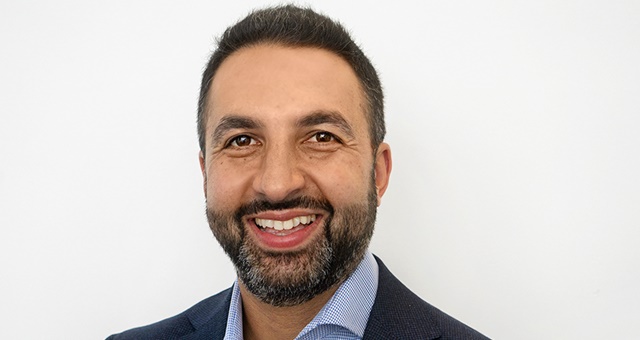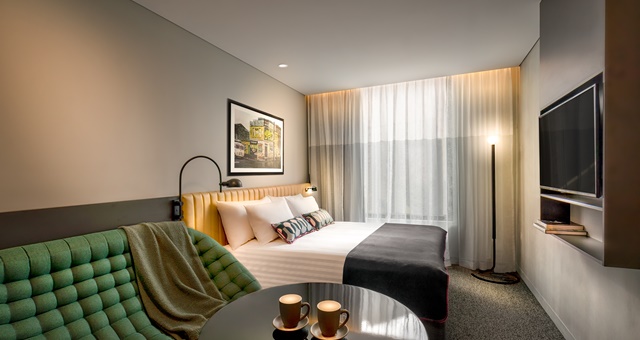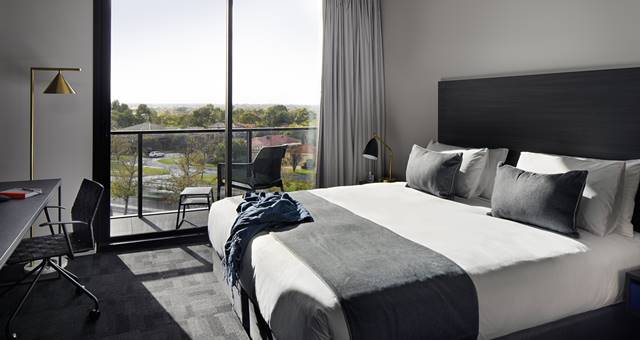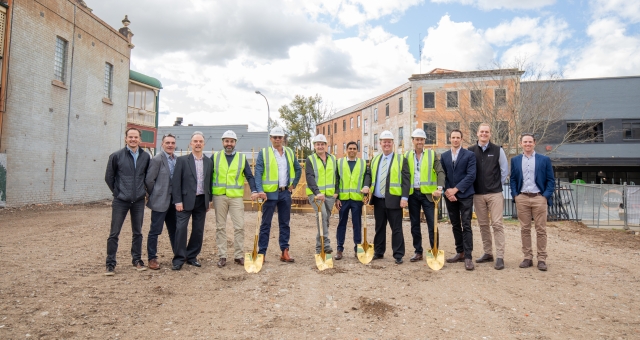With 20 hotels across three states – in Victoria, New South Wales, and Queensland – Veriu Group is well on its way to achieving its mission of becoming a larger player in the market. And the group is showing no signs of slowing down with an ambitious plan to reach 80 hotels ‘however long it takes’.
Following the opening of Veriu Queen Victoria Market, Veriu Group CEO Zed Sanjana spoke exclusively to HM about creating unique accommodation offerings, the corporate travel market, and the latest development updates in the group’s national expansion.
You’ve spoken before about there being a gap in the market in terms of unique accommodation with a localised experience. Can you share what Veriu Group is delivering on that front?
We’ve got this obsession with trying to create meaningful connections for guests that come to our hotels through either the history of the site location, or the precinct that it sits within. The last hotel that we opened, pre pandemic, was in Green Square, Sydney. It’s an area that’s going through a massive urban regeneration and it’s going to take probably 10-15 years of development for it to create its own real identity. Leveraging off the understanding of location was a bit difficult, so we focused on the site. Research indicated that it was the first Mercedes Benz dealership in Australia, so we have subtle nods to Mercedes Benz in the hotel. The reception desk is a 1960s Mercedes SUV cut in half and repurposed into a desk; in the rooms, the bed heads are made to look like the backseat of a Mercedes Benz. We try to use the FF&E that we design, procure and manufacture for each project separately, to create a really authentic experience for the guests that come to our hotels. It’s not like walking into a homogenized hotel that could be anywhere in the world.
How will Veriu Queen Victoria Market reflect and lean into the local neighbourhood in terms of the customer experience?
The [Queen Victoria] market is such a great opportunity because it has a really important place in Melburnians’ hearts. In terms of FF&E, there are lots of subtle and less subtle things that we do. The roof trusses are replicas of those inside the famous sheds. The Indian red [colour] on the trusses is also used for the tiles in the bathrooms. QVM Foundation provided us with an historic image of the front entrance of the market, which we sent to Italy to manufacture into [thousands of] mosaic tiles. It gets shipped here three months later and it’s the world’s biggest jigsaw puzzle for the tiler – who is our Revenue Manager’s father – to put together. It took about three days to put up. Even things like furniture selection, [the stool seating] is made from a potato sack; in the rooms, the market is represented in the artwork, and the decal at the back of the wardrobe is a distorted image from the lights of the night market. Those little touches help people feel really connected to where they are, and it also is a talking point – we want people to walk away with the story.
It’s also important that our [front of house staff] can connect guests to the experiences in the area. As part of their training, we encourage them to go out and find, for example, the three best breakfast places in the area and connect with those vendors, arrange chargeback arrangements with the traders so that our guests can then enjoy the same experience and can even charge it to their room. That’s why we call them ‘hosts’ – we want them to be a host for the guests in terms of driving their own individual experiences within the area so that they can live it like a local as opposed to missing out because no one told them.
Corporate travellers make up a big chunk of your guests. How has that segment performed this year for the business more broadly, and have you noticed any changes in what the corporate traveller is looking for?
There’s just been all this pent-up demand from both corporates and from domestic leisure travellers that has overwhelmed us. Right now, as a group, we’re 25% ahead of pre-pandemic ADR, and the group’s tracking about 90% occupancy across the board. The market has rebounded so much quicker than anyone thought. Corporate travel is a really resilient part of the accommodation market – leisure is a little bit more fickle. Because we operate under a lease structure where we pay rent regardless of how we perform, we want to have the security that our customer base is always going to be there, even if they pay a little bit less. I’ve been experienced with that customer in my career now for probably 14-15 years. COVID aside, the corporate travel market has been pretty strong and resilient throughout all sorts of challenges that the market has thrown at it, through the GFC, SARS, and everything else in between. I think it will be there forever and a day because people do business with people, and as long as that holds true, they need to be face to face. I can only speak from my own experience, my travel patterns are more or the same as they were pre COVID and I travel a lot to be able to do deals in this space.
The Punthill brand is also growing with properties under construction in Norwest (NSW) and Maitland (NSW). Are you focused mainly on suburban and regional areas for this brand?
We focus on differentiating the two brands by product type. Punthill is more of a traditional serviced apartment brand, which means it has a selection of studio, one-bedroom, two-bedroom apartments, and even three-bedroom apartments in some locations. Veriu is far more studio centric. It just so happens that when you’re building new product in the city, with the cost of land, it’s pretty hard to do two- and three-bedroom apartments these days. We have three Punthills in the city in Melbourne, one in South Yarra, we’ve just opened up one in Norwest in Sydney, and we have one in Brisbane. So, we’re expanding that brand, and Veriu, anywhere there’s demand from corporate travellers. Locations with office space, business parks, industrial parks, universities, hospitals all help drive demand from corporates, so that could be CBD, inner suburban, outer suburban or regional. Veriu by virtue of its product type is a bit more targeted to short stay because of the smaller rooms; length of stay might be two, two-and-a-half nights, whereas a Punthill might be five nights or a few weeks or months at a time for those working on projects in the area. We will probably introduce a lot more new product under the Veriu brand in CBD locations but that’s not to say we’re still not looking for Punthills in CBD locations.
We’re expanding quite rapidly. Veriu Queen Victoria Market is our first Veriu in Melbourne. We’re due to open our second in March – which is a Tim Gurner development in Collingwood on Johnson Street – and then we have another Punthill opening in Essendon around that time as well. We have a Veriu property in Macquarie Park under construction – that will be our biggest hotel at 184 keys. We have also started construction on one in Liverpool and one in Ryde. One in Sunshine here in Melbourne kicks off, one in Fremantle. I think by next year we’ll have opened another three – we’ve got one in Maitland opening as well. Then we’ll have probably between five and seven that will be under construction.
Fremantle will be your first location in WA? Why is that an important market for Veriu?
We are focused on regional markets, but Fremantle is a bit like Newcastle in New South Wales and like Geelong in Victoria – they’re not regional towns, they’re regional cities with infrastructure and very strong commercial backing. Our hotel is located across the road from the major hospital there, which provides all the healthcare for a lot of the regional towns around Fremantle. Hospitals drive overnight stays so we expect 30 or 40% of the business will come from that. Obviously, it’s a very strong tourist destination as well. There’s a really big shipping industry still in Fremantle, although that’s changing and evolving. It’s a 100-key hotel, really well located in the city, and it will have sea views. I don’t think there’s been a lot of great quality accommodation coming to the Freo market which has resulted in people opting for taking day trips. I think putting in good quality accommodation will grow the demand.
What’s the big focus at Veriu Group for 2023?
We want to consolidate on the year that we’ve just had, ramp up the new openings – Collingwood, Essendon and Maitland – and then we will be really focused on growth of the network. We look at about 150 opportunities a year; from that we send out probably 60 to 70 proposals, and from that we sign 25-30 heads of agreements. We sign maybe 10 binding agreement for leases, and then you might get six to eight hotels from that, so you’ve really got to go through a large volume of projects to find the right fit in terms of the site, the location, the partner.
We’re committed to building a network of assets that meet the needs of our customer base. Our corporate customers have location requirements around the country. We’ve got 20 hotels, which is nice, but it means we can only serve about 15-20% of their requirements. For us, it’s about learning from our customers where they need to be, where there’s a shortage of good quality accommodation for the product that we do, and then looking for opportunities with developers to build new products in those markets. Our goal is to get the group to about 80 hotels over, however long it takes, 10 years or more. That’s really the focus, to grow from a small or medium-sized business to a larger player that can develop those really close relationships with their customers because they have so many of their location needs covered.
Where would you like to be in terms of future locations?
There are so many! The number one location I want to be in Melbourne right now? I think the Melbourne Airport is ridiculously under supplied. If you compare passenger numbers at Melbourne Airport to Sydney Airport and look at the amount of inventory as a proportion, comparatively, it’s about three times under serviced to Sydney. I know that the Sydney Airport hotels thrive, they’re very solid assets, and even Green Square, which isn’t that far from the airport, leverages a bit of that. We’re working on [introducing a hotel] in Mascot. So, airport properties are important for us. We’re working on [a hotel] in Perth CBD, doing something a bit different – a refit of an old hotel – which is another exciting project that will hopefully come off. I’m excited about opening a hotel in more or less every state in Australia so we have a true national presence. And I think we’re getting closer. Between Victoria and New South Wales, we’ve got about a dozen projects that are at a meaningful stage, and now we’ve got some good traction in Adelaide. We’ve got a couple of good partners in Adelaide that we’re working with on sites in the CBD for both Punthill and Veriu.






